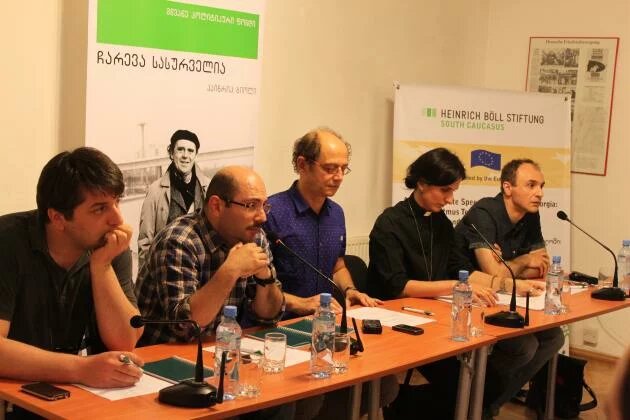
The discussion participants included Ms. Rusudan Gotsiridze, Bishop of the Evangelical-Baptist Church of Georgia; Mr. Nikoloz Laliashvili, MP, Christian-Democratic Party; Mr. Rati Amaglobeli, poet; and Mr. Giorgi Maisuradze, philosopher and representative of the Berlin Literature and Culture Research Centre. The audience gathered at the Heinrich Boell Foundation had an opportunity to hear four various opinions on the topic.
Mr. Nikoloz Laliashvili thinks that one can tell how secular the state is based on the number of religious people and whether their number decreases or not. He says that “secularization cannot take place where there are religious people”. As religiosity is high in Georgia, there is no secularization, so thinking of desecularization in the country is inconceivable. According to Mr. Laliashvili, a secularization process really strengthened after the Rose Revolution. The church moved from the centre to the periphery and lacked influence on politics and other spheres. But this did not last long. “Since 2007 this approach had been changed and religion regained a central role. The factor of the Patriarch became necessary for legitimization of a secular government, since its legitimacy in this period was very shaky. It could be said that the “update” of the church, and adoption to the existing reality, took place. The church strengthened its position, leading us to the current situation.”
The Christian-Democratic Party decided that the Constitution should reflect these circumstances in Georgia. We considered it appropriate to mention God in the Constitution’s preamble, states Mr. Laliashvili. “Despite the fact that this is mentioned in Article 9 of the Constitution we decided to set forth the role of Christianity more clearly. At our initiative, these words should be included in the preamble and the entry should say “based on Christian traditions”.
Not only desecularization, but even secularization itself is an incomprehensible concept for Georgian reality, considers the Bishop of the Evangelical-Baptist Church of Georgia. As Ms. Rusudan Gotsirdize noted, that absence of the universal concept of secularization makes the situation even more complicated. Therefore, it is unclear which form of desecularization or secularization we should be discussing. It is also vague how it is determined whether the state is secular in its set-up, legislation, values, and everyday life.
Ms. Gotsiridze thinks that civil culture in Georgia is well behind the existing legislation. Instead of legislation catching up with the requirements or orders from society, reality itself should catch up with legislation. As for the role of religion in society and the country, according to Ms. Gotsiridze, “religion is not a private space issue. On the one hand, it is a personal relation between a human being and God, but on the other hand, religion in itself implies religious practice of the community and living as a community. Since people unite around religion, they play a certain role in society”. Other speakers also spoke on the role of religion and the relationship between church and state.
“If we talk about the special role of the Orthodox confession of faith in the history of Georgia, with the same logic we can talk about the special role of the Armazi pagan cult, as for a minimum of six to seven centuries this religion was the basis for the formation of the (pre-Christian) Georgian state”, considers philosopher Mr. Giorgi Maisuradze. According to him, the issue concerns not the desecularization, but resacralization and counter-secularization. The resacralization process in Georgia started in 1987 when Ilia Chavchavadze was canonized as Saint Ilia. But if we still discuss secularization in Georgia, this process is mostly connected to Ilia Chavchavadze, who replaced the sacred order of God on the appointed King with a new principle and introduced the concept of the nation, which is a secular phenomenon. “Through resacralization of sacralization, the church conquers the space that secularization took from it”, states Mr. Maisuradze.
He also talked about constitutional changes and said that he considers the Christian-Democrats’ initiative to be absurd. In his opinion, “this is an attack on the State system and the justice and fairness principle when the Patriarch at his own initiative announces that he rules. The Patriarch is the greatest authority in Georgia, but it’s not his competence to issue orders that the state institutions should follow. “The legal basis of the state disintegrates when a state institution follows the instructions of a representative of a non-state institution, however great his/her authority should be”. Mr. Maisuradze also spoke about the Concordat between the state and the Georgia’s Orthodox Church and noted that it’s setting up was a mistake. “Until it is in place, the Georgian society will face many problems ahead”, he argued.
One more speaker at the discussion, Mr. Rati Amaglobeli, focused on the current understanding of Christianity in Georgia. “As a Christian, I am very much concerned about…how tragic the situation is. The main Christian concept is violated at every step that is taken… People are not able to make contact with this degraded Christianity and have a protest”. The reason for this, he thinks, is that people neither read nor are aware of Christian literature. According to him, “all political parties and church representatives should remember the strong power of Christ. It is like a baby power (Christ’s power) and not a collective worshipping, or legislative changes, or delivering a eulogy and ode for Christianity, but the respect (to each other) that we have, unfortunately, lost”.
Desecularization is not happening in Georgia due to a simple reason: it has never been a secular state. This point served as the key message from the discussion held at the Heinrich Boell Foundation Office on the topic “Politics and Religion: Desecularization Tendency”. The idea for the discussion occurred after the Christian-Democratic Party’s initiative for constitutional amendment. Since then, many interesting statements have been made in this regard, which naturally caused doubts of a strengthened desecularization processes.